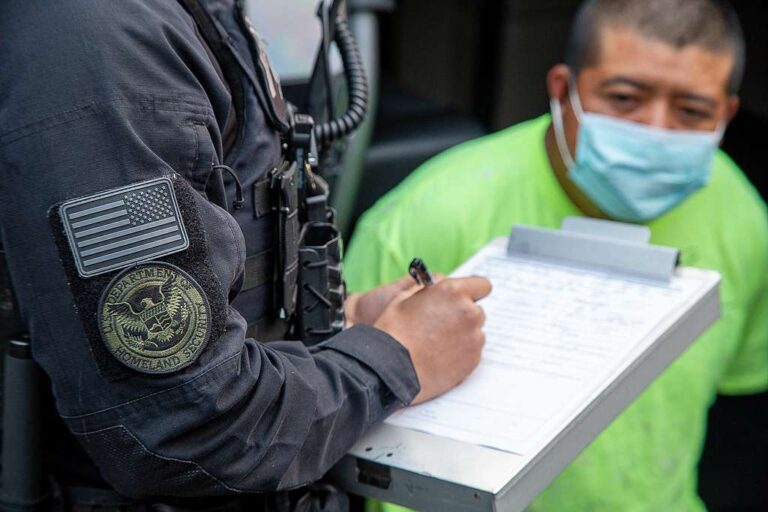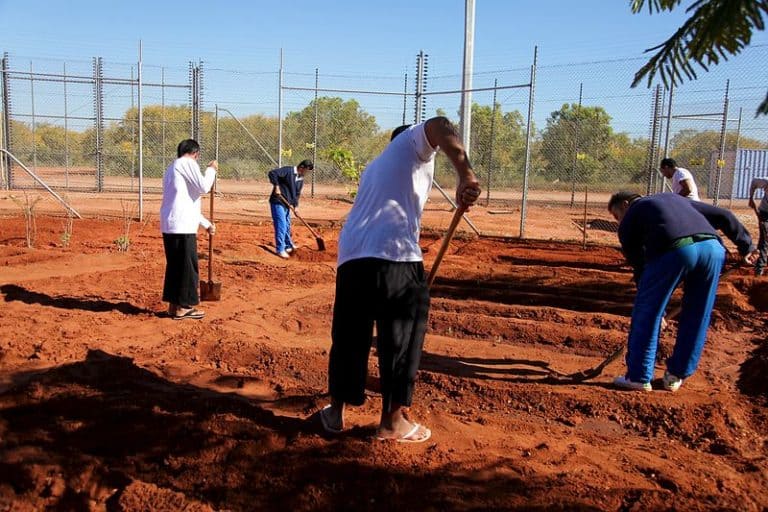Leora Smith is a student at Harvard Law School.
A recent ruling from the District Court of Colorado marked a small victory in the fight against unpaid, and underpaid labor in privately operated immigration detention centers.
At the end of February, Judge John Kane certified a class action lawsuit against GEO Group (“GEO”), one of the country’s largest private prison and detention center operators. The lawsuit, Menocal v. GEO, alleges that GEO violated the Trafficking Victims Protection Act (TVPA) by threatening immigration detainees with solitary confinement unless they agreed to complete maintenance tasks without pay. It also alleges that GEO was unjustly enriched by using detainee labor for other tasks at a rate of $1/day. Immigration detention centers save around $40 million each year by having detainees work for pay below minimum wage.
In his decision, Judge Kane certified two classes – one which includes around 2,000 people who participated in the $1/day “Detainee Voluntary Work Program” at GEO’s Aurora facility over the last three years, and the other which includes all 60,000+ people who were detained at the facility in the last ten years and forced to work there without any pay. The claim is novel in its scope and its use of the TVPA, and could have drastic impacts in the immigration detainee business – GEO runs five of the countries ten largest detention centers.
Last month, the Tenth Circuit Court of Appeal accepted GEO’s application to appeal the class certification. The outcome could have far-reaching impacts – motivating plaintiffs across the country to try bringing similar claims, or deterring them from doing so.
The Trafficking Victims Protections Act
Congress passed the TVPA in 2000, creating criminal liability for anyone who “knowingly…obtains the labor or services of a person [including] by means of force, threats of force, physical restraint, or threats of physical restraint to that person or another person.” In 2003, the Trafficking Victims Protection Reformation Act created a private right of action, allowing individuals who are trafficked or forced into labor to bring lawsuits against those who harm them.
In their claim against GEO, plaintiffs argue that the company violated the TVPA through it’s “Housing Unit Sanitation” policy which dictated that six detainees be randomly selected in each “pod” every day and forced to complete maintenance tasks without pay, under threat of solitary confinement. The tasks included cleaning their own and other detainees’ cells, as well as “walls, floors, windows, window ledges, showers, sinks, toilets, tables, and chairs.”
In their motion to dismiss the defendants argued that the tasks simply constituted “personal housekeeping” which, according to a Fifth Circuit thirteenth amendment case explored later in this post, can legally be unpaid in the immigration context.
Plaintiffs maintain that the tasks they completed extended beyond personal housekeeping. They offer as additional evidence that GEO employs only one custodian, who is paid $12/hour, to service the entire facility. They also use this fact to support their unjust enrichment claim.
Constitutional claims unexplored
Lurking in the background of this case is the thirteenth amendment, violations of which plaintiffs did not allege in any of their filings.
The thirteenth amendment bars slavery and involuntary servitude, “except as a punishment for crime whereof the party shall have been duly convicted.” Because the plaintiffs were detained without being convicted of anything, forcing them to work could amount to a constitutional violation. However, courts are divided on this question. Specifically, courts are divided on the kinds of labor that constitutes “involuntary servitude.”
Channer v. Hall, a Fifth Circuit case, is the only federal appeals case to deal with the specific issue of forced labor in immigration facilities. There, a plaintiff claimed he had been forced to work 8-hour shifts in the facility’s Food Services Department, under threat of being placed in solitary confinement. The court held that this work did not fit the definition of “involuntary servitude,” and instead that it fell under the civic duty exception to the thirteenth amendment, which allows the government to compel jury duty, military services, and in this case, “housekeeping tasks.”
The Second Circuit, however, seems to disagree. In McGarry v. Pallito, a pretrial detainee in Vermont brought a lawsuit claiming he had been forced to work in the prison laundry under threat of being placed in solitary confinement and other disciplinary procedures. A District Court dismissed his claim, saying that compelled laundry work did not constitute “the slavery that gave rise” to the thirteenth amendment, but the Second Circuit reversed. The Court decided that the thirteenth amendment prohibits “all forms of involuntary labor,” and that pretrial detainees must be protected by the amendment because they are not explicitly excluded from it. It is reasonable to compare immigration detainees, who have never been “duly convicted” of anything, to pretrial detainees. Indeed, the standards that govern immigration detention facilities are based on the American Correctional Association’s standards for pretrial criminal detainees.
Given the competing precedents, it possible that the plaintiffs avoided this cause of action for the relatively more straightforward TVPA violation. The law is also unsettled regarding whether plaintiffs can bring a thirteenth amendment claim against private government contractors.
Despite plaintiffs’ avoidance of the constitutional claim, defendants’ motion to dismiss did cite to Channer v. Hall, arguing that its holding should persuade the court. However, the plaintiffs disagreed on a number of grounds, including that Congress specifically passed the TVPA after Channer to ensure redress for “severe forms of worker exploitation that do not rise to the level of involuntary servitude.” While it is yet to be seen whether this argument is a winning one, it has been permitted to move on to trial. It will be the first time that a case of this nature will proceed under the TVPA.
Potential impact of the case
Interestingly, President Trump held a “listening session” a couple of months ago with organizations committed to ending human trafficking around the world, including in the United States. Afterward, Trump committed to putting the “full force and weight” of his office behind the fight. The cause seems to be a personal one adopted by the President’s daughter Ivanka, who some say planned the session.
The current administration’s fixation on immigration, expressed intention to detain and deport more non-citizens, and support for partnering with private contractors in their endeavor also make this case particularly important. While this claim is limited to one detention facility, there are many others just like it. At any given time, 400-500,000 people are held in immigration detention in the United States. The court’s openness to this cause of action, and to it proceeding as a class action, might encourage current and former detainees in other jurisdictions to test out similar claims.









Daily News & Commentary
Start your day with our roundup of the latest labor developments. See all
July 11
Regional director orders election without Board quorum; 9th Circuit pauses injunction on Executive Order; Driverless car legislation in Massachusetts
July 10
Wisconsin Supreme Court holds UW Health nurses are not covered by Wisconsin’s Labor Peace Act; a district judge denies the request to stay an injunction pending appeal; the NFLPA appeals an arbitration decision.
July 9
In Today’s News and Commentary, the Supreme Court green-lights mass firings of federal workers, the Agricultural Secretary suggests Medicaid recipients can replace deported farm workers, and DHS ends Temporary Protected Status for Hondurans and Nicaraguans. In an 8-1 emergency docket decision released yesterday afternoon, the Supreme Court lifted an injunction by U.S. District Judge Susan […]
July 8
In today’s news and commentary, Apple wins at the Fifth Circuit against the NLRB, Florida enacts a noncompete-friendly law, and complications with the No Tax on Tips in the Big Beautiful Bill. Apple won an appeal overturning a National Labor Relations Board (NLRB) decision that the company violated labor law by coercively questioning an employee […]
July 7
LA economy deals with fallout from ICE raids; a new appeal challenges the NCAA antitrust settlement; and the EPA places dissenting employees on leave.
July 6
Municipal workers in Philadelphia continue to strike; Zohran Mamdani collects union endorsements; UFCW grocery workers in California and Colorado reach tentative agreements.